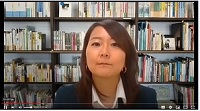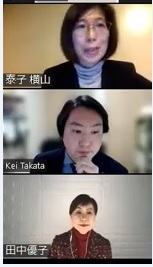Award Ceremony “7th Professor Josef Kreiner Hosei University Award for International Japanese Stu dies”2022/03/18
Award Ceremony “7th Professor Josef Kreiner Hosei University Award
for International Japanese Studies”
Date/Time:March 9th, 2022 17:00-18:30 (JST/KST) [Online via Zoom]
■Award Winner Jiyoung Kim (Sookmyung Women’s University)
■Moderator Yasuko Yokoyama(Hosei University)
■Opening Remarks Kei Takata(Hosei University)
■Congratulatory Address Yuko Tanaka(Hosei University)
On March 9th, 2022, the Hosei University Research Center for International Japanese Studies (HIJAS) hosted an award ceremony for the “7th Professor Josef Kreiner Hosei University Award for International Japanese Studies.” The award has been created to publicly celebrate Professor Josef Kreiner in his remarkable academic efforts to promote Japanese studies and to encourage Japanese studies scholars residing outside of Japan. After careful consideration, our selection committee has chosen Dr. Jiyong Kim from the Sookmyung Women’s University in South Korea for her book Nihon bungaku no sengo to hensō sareru Amerika: Senryō kara bunka reisen no jidai e.
In a normal setting, the awardee will be invited to Hosei University in Tokyo for the ceremony, but because of the Covid-19 pandemics, the event took place in an online format. The testimonial was bestowed online to Dr. Kim, who participated from South Korea during the award ceremony moderated by Professor Yasuko Yokoyama, the director of HIJAS.
In the opening remark, I have emphasized the significance of the work that captures Japan from a transnational lens. Primarily, the book has successfully depicted the transnational phenomena from a multi-layered perspective by combining analysis of the novels, the US cultural diplomacy, and the institution of international exchange. Subsequently, Professor Yuko Tanaka, a former president of Hosei University, delivered a congratulatory address. She mentioned how naturally the American culture has infused into the lives of ordinary Japanese people and emphasized the importance of Dr. Kim’s work on uncovering from the historical perspectives how this came about throughout post-war Japan.
After the award ceremony, Dr. Kim gave us a commemorative lecture based on her prize-winning work. The address provided a detailed narrative about the post-war Japanese writers who have traveled to America through the Rockefeller foundation fellowship established under the US Cold War cultural diplomacy. How did the foundation select Japanese fellows who were expected to promote American values? How did the experience of their stay in the US impact Japanese fellows’ works after their return? The lecture finely answered these questions by introducing texts found in Rockefeller archival center and the writings by the Japanese fellows.
This year’s Kreiner Award was the first time it was presented to a scholar from Asia. At the beginning of her lecture, Dr. Kim mentioned her approach of exploring post-war Japanese literature and culture from a lens of the “Cold War” that has emerged due to her background as a scholar from South Korea, where the Cold War structure continues until today. I would also assume that her transnational experience of living in Japan, including the period during her childhood, has perhaps also influenced her to explore cultural phenomena that cut across national borders.
We will continue to welcome the application of outstanding works on Japan from across the world.
Kei Takata (Hosei University)
 |
Jiyoung Kim |
 |
Yasuko Yokoyama (Director of HIJAS)
Yuko Tanaka |

